Showing 1–12 of 15 results
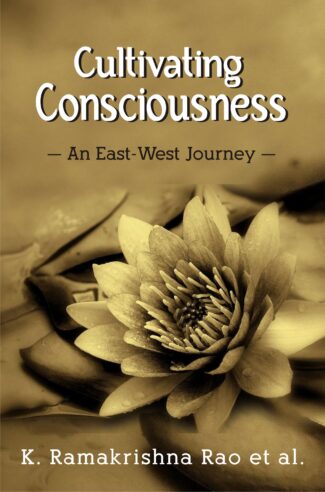
This book contains transdisciplinary discussions on the nature of consciousness, the methods of studying it, the relevance of consciousness to our values and its role in enhancing human potentials and wellness. Chapters of Ramakrishna Rao, devoted to Yoga, Advaita and Buddhism and contrasts the Indian views with those in the West, make the book a unique collection
Consciousness is the distinctive and defining future of human condition. Its study is at once fascinating and frustrating, because consciousness is too familiar to ignore and too complex and elusive to understand and explain. Many consider understanding consciousness the greatest challenge facing twenty-first-century science.
Cultivating Consciousness is an absorbing East West dialogue on the conceptual, methodical and theoretical issues. In this unique collection of scholarly articles by eminent researchers in and exponents of consciousness studies we find transdisciplinary discussions on the nature of consciousness, the methods of studying it, the relevance of consciousness to our values and its role in enhancing human potentials and wellness. Ramakrishna Rao discusses consciousness from the perspective of classical Indian thought in separate chapters devoted to Yoga, Advaita and Buddhism, and contrasts the Indian views with those in the West.
Over all, the book gives the nature of things to come, the controversies and complexities involved and the imminent clash of paradigms. This volume is more than a study in contrast; it is an intellectual bridge that facilitates the travel and exchange between the spiritual and scientific traditions of East and West and between first-person and third-person perspectives.
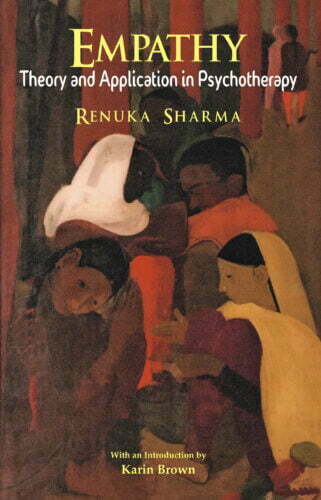
Empathy is quite often misunderstood as sympathy. It has its cognate in the Eastern or contemplative practice of compassion (karuna, metta, krpa) toward another, and also to sorge or care in phenomenological hermeneutics. The book demonstrates the way in which using empathy as a means of diagnosis leads to different, more successful results and course of action in psychoanalysis.
Empathy is a term much used in popular culture and professional circles. Yet it remains one of the most misunderstood tropes. Most people confuse or conflate empathy with sympathy; though related, these involve somewhat radically different affective or psychological registers. Empathy is founded on the art of understanding a living being’s particular mental state or inner condition, in respect of his/her predicament, pain, suffering, anguish, fear, grief, sorrow, frustration, and anger in certain trying circumstances. There can even be comportment with another’s joy and exhilaration. Its proper use makes possible a much deeper understanding of human communication, relation, intentionality, and action. As such its cognate in the Eastern or contemplative practice of compassion (karuna, metta, kripa) toward another, and also to sorge or care in phenomenological hermeneutics. Thus, there are cognitive, affective and ethical components in the practice of empathy.
The importance of empathy whether in everyday life or as a clinical tool in therapeutic and palliative settings cannot be more emphasized. The book demonstrates the way in which using empathy as a means of diagnosis leads to different, more successful results and course of action. In so doing, the study challenges the erstwhile neglect and misconception of the role of empathy in transference and introspective processes availed in psychoanalysis.
The book introduces novices in the field to the rich literature of psychoanalysis and philosophy, combining conceptual phenomenology with empirical data collected in a clinical setting. Testing the theory against clinical cases, as the book engages with, lends itself to a more solid conceptualization that can be poignantly articulated and studied further. The book will benefit students and practitioners in counselling, social work, psychiatry, psychoanalysis, psychotherapy and philosophy.
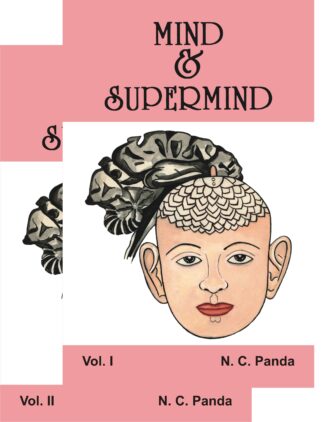
The book systematically unfolds Vedantic psychology to evolve an integrated perspective on mind and to synthesize ancient wisdom with contemporary sciences. The author also speculates on linking mind to the supermind the Brahman.
Astonishingly rich is the heritage of Indian psychology. Embodied in some of the better-known, traditional philosophical systems, it convincingly spells out the rationale behind memory, recognition, emotions, instincts, reasoning, creativity, and myriad other mind-related phenomena, which sofar remain baffling, unanswered questions in modern cognitive sciences, mechanistic psychology and their kindred disciplines. Mind and Supermind, for the first time, systematically unfolds Vedantic psychology in its larger effort not only to evolve an integrated perspective on mind, but also to synthesize ancient wisdom with contemporary sciences. A distinguished scholar of Sanskrit, philosophy and science, Professor Panda here re-explores the nature of mind, its Indian concept and how it compares with its Western world-view: religious, philosophical, psychological, and scientific. Thus elaborating the concepts of mind as set out in the Sankhya, Yoga, Tantra, Vedanta and other orthodox systems vis-a-vis (a) philosophical perspectives: from Plato and Aristotle to Wittgenstein and Strawson, (b) psychological viewpoints of William James, Freud, Jung, Watson and others, (c) theories of modern physiologists/physicists governing brain, mind, and artificial intelligence; the author builds a solid foundation for the superstructure of parapsychological phenomena. And also speculates about the possibilities for (individual) mind to link up with the Supermind, which, in Vedantic concept, is Brahman: fundamental Consciousness that illumines everything living and non-living. Growing from years of Dr. Pandas indepth, analytical studies, the book is offered to dis-cerning audiences in two parts: Indian Perspective (Volume 1) and Western Perspective (Volume 2), with relevant illustrative material.
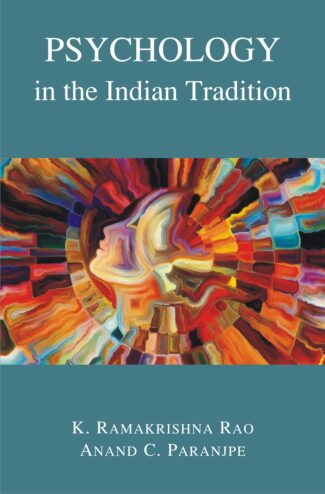
This authoritative volume draws the contours of Indian psychology, describes the methods of study, defines the critical concepts, explains the central ideas, and discusses their implications to psychological study and application to life.
Professors Ramakrishna Rao and Anand Paranjpe are two distinguished psychologist-philosophers who pioneered what has come to be known as Indian psychology. In this authoritative volume, they draw the contours of Indian psychology, describe the methods of study, define the critical concepts, explain the central ideas, and discuss their implications to psychological study and application to life.
The main theme is organized around the theme that psychology is the study of the person. They go on to present a model of the person as a unique composite of body, mind, and consciousness. Consciousness is conceived to be qualitatively and ontologically different from all material forms. The goal of the person is self-realization, which consists in the realization of the true self as distinct and separate from the manifest ego. It is facilitated by cultivating consciousness, which leads to some kind of psycho-spiritual symbiosis, personal transformation, and flowering of ones hidden human potentials.

This authoritative volume draws the contours of Indian psychology, describes the methods of study, defines the critical concepts, explains the central ideas, and discusses their implications to psychological study and application to life.
Professors Ramakrishna Rao and Anand Paranjpe are two distinguished psychologist-philosophers who pioneered what has come to be known as Indian psychology. In this authoritative volume, they draw the contours of Indian psychology, describe the methods of study, define the critical concepts, explain the central ideas, and discuss their implications to psychological study and application to life.
The main theme is organized around the theme that psychology is the study of the person. They go on to present a model of the person as a unique composite of body, mind, and consciousness. Consciousness is conceived to be qualitatively and ontologically different from all material forms. The goal of the person is self-realization, which consists in the realization of the true self as distinct and separate from the manifest ego. It is facilitated by cultivating consciousness, which leads to some kind of psycho-spiritual symbiosis, personal transformation, and flowering of ones hidden human potentials.

Various articles in this anthology have successfully explored folk psychological notions as found in contemporary Western Philosophy of Mind in the Indian context. These collective reflections on the nature of Indian folk psychology are bound to enrich our understanding of the mind in Indian philosophy.
Reconstructing Folk Psychology is the outcome of a research that looks into the possibility of locating folk psychological structures and issues within the domain of classical Indian philosophy. Starting from the concepts of belief, desire to perception and the consciousness of time and even the way in which we address ourselves, the I, the authors of the various articles in this anthology have successfully explored folk psychological notions as found in contemporary Western Philosophy of Mind in the Indian context. This volume thus tries to locate and reconstruct folk psychological issues within Indian philosophy, paying particular attention to the classical Indian tradition.
Needless to say, each of the authors in this volume is an expert in his or her respective area and these collective reflections on the nature of Indian folk psychology are bound to enrich our understanding of the mind in Indian philosophy.
This short but interesting book should capture the interest and attention of who is who in the domain of Indian philosophy and psychology.
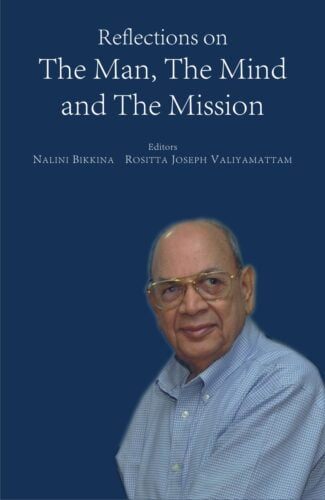
This Festschrift contains reminiscences, reflections, special messages and papers by scholars and academicians from around the globe who are familiar with Prof. K. Ramakrishna Raos epoch-making contributions; and memoirs of Prof. Rao titled Wide Open Horizons: A Short Story of My Tryst with Destiny, an intellectual delight.
Reflections on the Man, the Mind and the Mission; a Festschrift on the 85th Birthday of Koneru Ramakrishna Rao is a humble tribute to Prof. Koneru Ramakrishna Rao, one of the tallest scholars of our times. This Festschrift contains reminiscences, reflections and papers by scholars and academicians from around the globe who are familiar with Prof. Raos epoch-making contributions. The book also contains special messages from luminaries in diverse disciplines who are friends and admirers of Prof. Rao. Scholarly reviews of some of his most recent books have also been included. The volume concludes with the brief memoirs of Prof. Rao titled Wide Open Horizons: A Short Story of My Tryst with Destiny, an intellectual delight.
Prof. Rao is a scholar, philosopher, scientist, educationist, leader and visionary with an incredible ability to live his amazing dreams. He dabbles with the intricacies of Psychology and Parapsychology, Philosophy and Yoga, Consciousness Studies and Gandhian Thought, Educational Administration and Information Science, with equal ease and astounding finesse. And above all, here is a man untouched by time. In his 85th year, he is more active than ever before, enriching academia and society at large with his erudition and philosophical acumen, profound thought and most exemplary leadership. The year 2017 will see the publication of his five remarkable volumes.
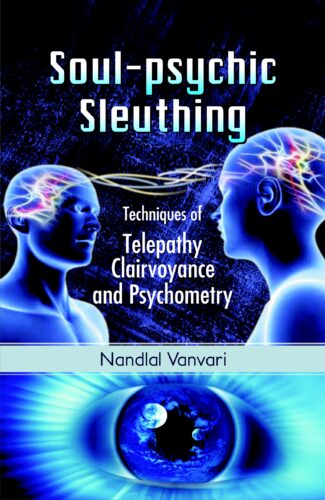
This book deals extensively with the sleuthing techniques of telepathy, clairvoyance and psychometry. When soul-psychic sluething is applied extensively, it will minimize troubles and traumas, corruption, and terrorism in the civilized societies. It incorporates the views of Taoist and Confucius, and of the modern psychologists giving a new dimension to soul-psychic sluething.
Soul-psychic Sleuthing will help us bring peace, harmony and welfare of society we live in. When it will be applied extensively, it will minimize troubles and traumas, corruption, and terrorism in the so-called civilized societies.
The Hindu scriptures talked of atma-manthan (soul-churning) because it is only atma, i.e. soul which being one with the Universal Consciousness, knows the truth, which in turn can reach the best solution. Truth shall win. This enforces the application of the Soul-psychic Sleuthing.
There are many techniques of the soul-psychic sleuthing. However, this book concentrates only on three of these telepathy, clairvoyance, and psychometry. Based on Taoist and Confucius wisdom texts, and the views of the modern psychologists, this study provides in detail the methods to develop these talents. Presenting the sleuthing practised by seers and mystics, psychic readers and trackers, telepathists, consultants in their areas and others, it delves into each of the three techniques in-depth.
The soul-psychic sleuthing needs reason, courage, majesty, morals, ethics, values and a tranquil mind besides the absolute purity of thought and intention.

This book deals extensively with the sleuthing techniques of telepathy, clairvoyance and psychometry. When soul-psychic sluething is applied extensively, it will minimize troubles and traumas, corruption, and terrorism in the civilized societies. It incorporates the views of Taoist and Confucius, and of the modern psychologists giving a new dimension to soul-psychic sluething.
Soul-psychic Sleuthing will help us bring peace, harmony and welfare of society we live in. When it will be applied extensively, it will minimize troubles and traumas, corruption, and terrorism in the so-called civilized societies.
The Hindu scriptures talked of atma-manthan (soul-churning) because it is only atma, i.e. soul which being one with the Universal Consciousness, knows the truth, which in turn can reach the best solution. Truth shall win. This enforces the application of the Soul-psychic Sleuthing.
There are many techniques of the soul-psychic sleuthing. However, this book concentrates only on three of these telepathy, clairvoyance, and psychometry. Based on Taoist and Confucius wisdom texts, and the views of the modern psychologists, this study provides in detail the methods to develop these talents. Presenting the sleuthing practised by seers and mystics, psychic readers and trackers, telepathists, consultants in their areas and others, it delves into each of the three techniques in-depth.
The soul-psychic sleuthing needs reason, courage, majesty, morals, ethics, values and a tranquil mind besides the absolute purity of thought and intention.
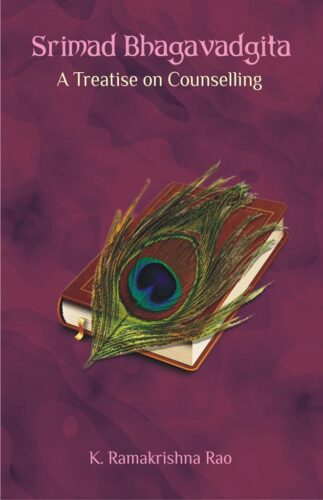
This book is a modest attempt to bring into focus the psychological implications and some of the lessons we could learn from the Bhagavad Gita that are as relevant to the troubled world today as they were then.
The Srimad Bhagavad Gita is an epic story of the battle between good and evil, and the psychological hurdles one faces in such a battle, in addition to the physical hardships one has to endure. The former are more difficult to handle. The Gita is a treatise on celestial counselling that Arjuna needed in the midst of his battle with the evil forces that happened to be a part of his larger family. It is an illustration that man is a composite of good and evil. His goal is to overcome evil and promote the divine within. There is much in the Gita that counsellors in various fields could learn for their benefit.
The Gita was a constant companion of Mahatma Gandhi who developed his concept of nonviolence and the strategy of satyagraha as effective instruments for conflict resolutions. Satyagraha was his way of resolving the manifest conflict between good and evil by synthesizing the two opposite by a dialectical process.
This book is a modest attempt to bring into focus the psychological implications and some of the lessons we could learn from this epic narrative that are as relevant to the troubled world today as they were then.
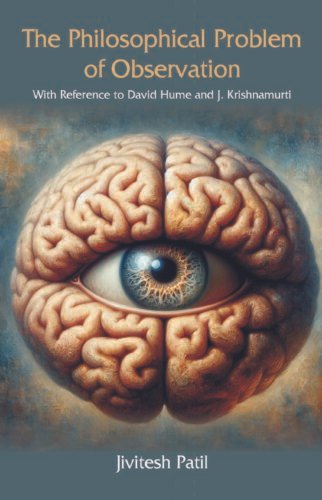
It talks about the contrasting philosophies of J. Krishnamurti and David Hume navigating the convergence of their thoughts on the observer’s role in the process of observation. In so doing, it delves into the world of philosophy of mind as it spans ancient to modern times.
“The Philosophical Problem of Observation with Reference to David Hume and J. Krishnamurti offers a sophisticated exploration of the intricate relationship between perception, the self and the observer. Engaging with the empiricism of David Hume and the meditative insights of J. Krishnamurti, the book delves into fundamental questions about the nature of observation, its role in shaping human understanding, and its implications for knowledge and consciousness. Dr Patil critically examines Hume’s dissection of perception and belief alongside Krishnamurti’s radical proposition of observation without an observer, illuminating their shared rejection of a permanent self. By bridging distinct philosophical traditions, this book investigates the transformative potential of a pure, unconditioned state of perception and challenges entrenched notions of cognition and the self.
Addressing key questions such as the influence of memory and belief on perception and the unity of the observer and the observed, the book presents a compelling dialogue between philosophical inquiry and practical introspection. It weaves philosophy, psychology, and consciousness studies into an interdisciplinary framework for achieving clarity into the question of self and observation. This thought-provoking work is an essential read for scholars of philosophy and cognitive science, as well as seekers of deeper understanding. With its innovative insights, it offers a roadmap for navigating the philosophical dimensions of perception and unlocking the transformative aspect of observation.”
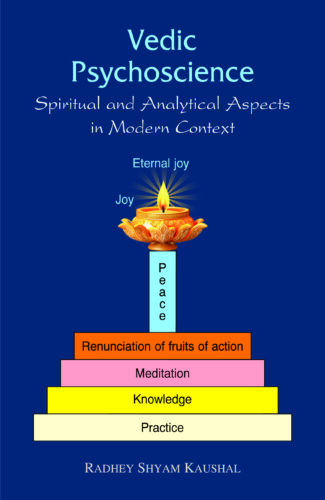
This book is a scholarly attempt to develop “psychoscience” in the light of Vedic wisdom. It initiates to give deeper foundations to various aspects of Vedic wisdom in the spirit of modern science using analogies from modern science, demonstrating the eternity and universality of some aspects of Vedic concepts.
“This book is a scholarly attempt to develop “psychoscience” in the light of Vedic wisdom. It initiates to give deeper foundations to various aspects of Vedic wisdom in the spirit of modern science using analogies from modern science, demonstrating the eternity and universality of some aspects of Vedic concepts. It is targeted to encourage young scientific minds to explore further the theoretical developments and applications in the fields of personality development and behavioural science. It, further, descriptively discusses the experience of absolute reality in Nature in terms of three basic aspects: perception at gross-body level; rational thinking at micro-body level; and realization at causal-body level.
The volume is divided into three parts. Part 1 accounts for the link of psychoscience with causal existence, basically dealing with the art of enlightenment of an individual. Part 2 addresses the foundations of psychoscience. Part 3 focuses on the behavioural and application aspects of psychoscience.
The book, written in an objective and non-sermon style, addresses a wide gamut of readers such as physicists, chemists, brain-scientists, psychologists, philosophers and philosophers of science with some scientific temper, at times employing convenient mathematical methods and justifying the universality and eternity of inherent truths.”
| There are no products |